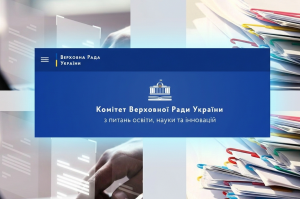Impact of the War on Higher Education in Ukraine
 Russian invasion to Ukraine has caused a set of serious problems in Ukrainian education. First of all, this concerns the forced displacement of a significant number of the Ukrainian population and the destruction and damage to educational institutions as a result of hostilities.
Russian invasion to Ukraine has caused a set of serious problems in Ukrainian education. First of all, this concerns the forced displacement of a significant number of the Ukrainian population and the destruction and damage to educational institutions as a result of hostilities.
Last estimates show that almost 13 million Ukrainians have left their homes. According to a survey conducted from June to August by the Ministry of Education and Science, more than 70% of higher education institutions reported that a small number (from 1 to 30%) of their students were internally displaced or evacuated abroad.
This year, more than 131 thousand school graduates entered higher education institutions in Ukraine. 11 thousand of them took advantage of the privileges granted to people from the regions where active military actions are taking place and from temporarily occupied areas.
According to this Survey, more than half of all higher education institutions indicated that from 1 to 30% of their teachers became internally displaced persons or moved abroad. It is reported that the majority of teachers of higher education institutions have returned to teaching and research duties at their educational institutions in the next academic year.
At the same time, for various reasons, about 2000 academic staff could not continue teaching and research after February 24, and 63 educational institutions reported a shortage of teachers.
The occupants destroy everything: critical infrastructure, residential buildings, hospitals, different educational and scientific institutions, schools, kindergartens, libraries.
As of today, 2532 educational institutions have already been damaged due to bombing and shelling by the Russian occupiers. 289 of them are completely destroyed. More than 45 universities were totally destroyed as well. According to the latest estimates, the need for recovery of the destroyed and damaged educational institutions is over $9 billion, of which $2.8 billion is urgent.
Now about 1300 schools and 12 universities are located on the temporarily occupied territories.
In Ukraine there are 282 higher education institutions and 338 institutions of professional pre-higher education. Since the beginning of the war, 30 higher education institutions and 44 institutions of professional pre-higher education were temporarily relocated from those regions where active military actions are taking place and from temporarily occupied areas.
In order to start working offline all educational institutions in safe regions must have shelters. There can be as many students and teachers in the educational institution at the same time as the shelter can potentially accommodate. In view of this, universities are offered options for studying in different shifts, as well as distance learning.
The form of education process is determined by military administrations and can be changed during the year. Currently, all educational institutions have autonomy in the organization of the educational process. Therefore, the decision on the form of work of teachers is made by the heads of higher education institutions.
According to the data of the Ministry of Education and Science received from higher education institutions, 37% of HEIs started the new academic year remotely (online), 9% of them - offline, 54% of HEIs started working in mixed form of education.
Ministry of Education emphasized that Ukrainian universities, de jure, are self-governing, in particular, they have the right to determine the date of the start of education process. But at the same time the Ministry of Education recommended to start education process earlier - around August 15.
The main reason for the early start is to save electricity and fuel, because in the warm season the cost of heating and other utilities is significantly lower. For these reasons, it is recommended to work on Saturdays in the warm season.
It is also proposed to complete the winter examination session by the end of November 2022, and to start the second semester no earlier than February 15, 2023.
International Department
 Пенсії проіндексовано на 12,1%: перерахунок відбувся автоматично
Пенсії проіндексовано на 12,1%: перерахунок відбувся автоматично















